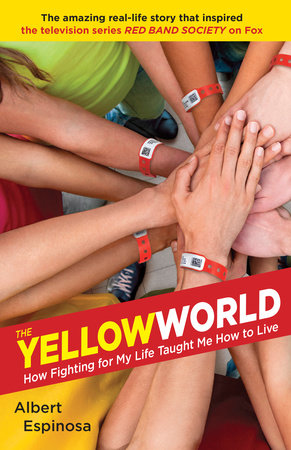Excerpt
The Yellow World
9780345538123|excerpt
Espinosa / THE YELLOW WORLD
Beginning . . .
The Yellow World
Don’t hold the knife in your left hand.
Don’t put your elbows on the table.
Fold your napkin properly.
That’s the beginning.
—Gabriel Celaya
Where Were You Born?
Well, I was born from cancer. I like the word cancer. I even like the word tumor. It might sound creepy but it’s just that my life has been connected to these two words. And I’ve never felt anything horrible about saying cancer or tumor or osteosarcoma. I grew up with these words and I like to say them out loud, to shout them at the top of my voice. I think that until you say them, make them part of your life, then it’s difficult for you to accept them.
That’s why I need to speak about cancer in this first chapter, because later in the book I’m going to explain the lessons that cancer taught me to survive my life. So I’ll start off by talking about it and how it affected me.
I was fourteen years old when I had to go to the hospital for the first time. I had an osteosarcoma in my left leg. I left school, left my home, and started my life in the hospital.
I had cancer for ten years, from the ages of fourteen to twenty-four. This doesn’t mean that I spent ten years in the hospital but that for ten years I was going to various different hospitals to get treated for four cancers: leg, leg (same leg both times), lung, and liver.
En route I left behind one leg, one lung, and a chunk of my liver. But I have to say that, at the time, I was happy when I had cancer. I remember it as one of the best times of my life.
It might be a shock to see these two words next to each other: happy and cancer. But that’s how it was. The cancer might have taken material things away from me, but it taught me lots of other things that I would never have found out by myself.
What can cancer give you? I think the list is endless: You find out who you are, you find out what sort of people you live with, you discover your limits . . . above all you lose your fear of death. Maybe this last is the most valuable thing.
One day I was cured. I was twenty-four and they told me that I didn’t have to go back to the hospital. I was scared stiff. It was weird. The thing I knew how to do best of all was to fight against cancer and now they told me that I was cured. This weirdness, this stupor, lasted for six hours, then I went mad with joy; not to go back to the hospital, not to have any more X-rays (I think I’d had more than two hundred and fifty), no more blood tests, no more tests of any kind. It was a dream come true. It was completely unbelievable.
I thought that in a few months I’d forget all about cancer. I’d have a “normal life.” Cancer would just be a stage I’d gone through. But instead (I’ve never forgotten it), something strange happened. I never imagined how much the lessons of cancer would help me in my daily life.
It’s the great gift that cancer has given me: lessons (you have to call them something, although maybe I prefer the word discoveries) that help my life to be easier, happier.
What I will explain in this book is nothing more than how to apply to your day-to-day life the lessons I learned from cancer. Yes, exactly, now that I think of it, that’s what this book could be called: How to Use Cancer to Get Through Life. Maybe that’ll end up being the book’s subtitle. It sounds odd, it sounds just the opposite of most of the books that get written about cancer, but that’s just how it is. Life is paradoxical (I love contradictions). I want to make it clear that this book is a collection of everything I learned from cancer and also of the discoveries that my friends who were also fighting this illness showed me.
Well, that’s the story of cancer and me up till now. I like how I’ve summed it up; I’m happy with it. The story has begun. Now let’s carry on with the yellow world.




